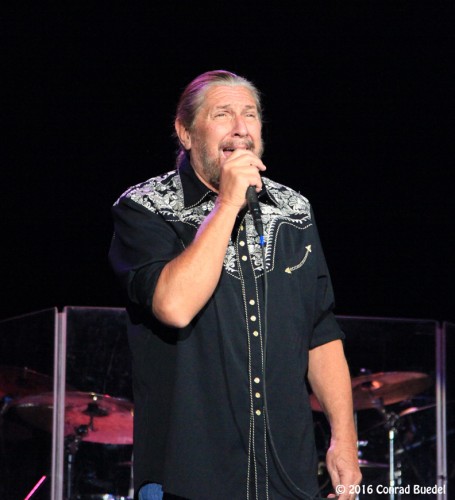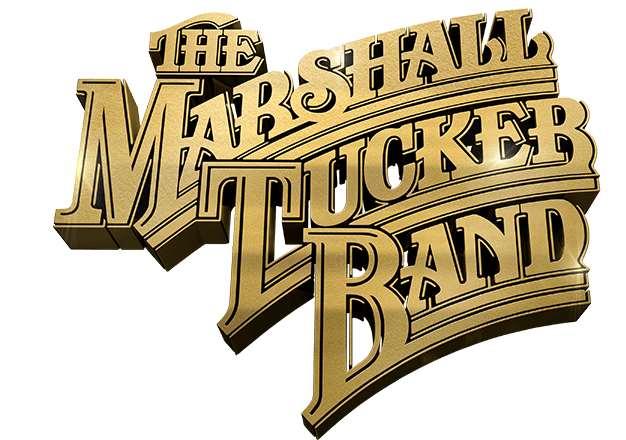Great New Article from the Tahoe Onstage

Doug Gray, Marshall Tucker Band’s long, hard ride of triumph and tragedy
By Tim Parsons for Tahoe Onstage
Doug Gray is not just a quintessential ramblin’ man. He is the Ramblin’ Man.
Some childhood friends started what was to become the Marshall Tucker Band before they went off to serve in the Vietnam War, and during its heyday the group played more than 300 concerts annually. It experienced revolutionary success and horrific tragedy. At age 68, Gray, the lead singer, is the only original member remaining on the long, hard ride, which these days has about 172 travel days a year.

Doug Gray was all smiles, stories and songs during a May 7 performance at the MontBleu Theatre at Stateline, Nevada.
Tahoe Onstage photos by Conrad Buedel
Gray’s been onstage thousands of times, so it certainly it would be naïve to ask him about a particular show from 40 years ago. However, a person who attended a particular concert remembers it vividly because it was the first time he was truly moved by live music. So he took a chance and asked Gray about a summertime show at the Santa Barbara County Bowl in 1978.
“Little Feat opened that one, right?” Gray said. “Yes. I remember. They had a sound-level ordinance because of the houses on the hill. The way I remember that stuff is because I am talking to somebody who it mattered to. I can pretty much pull it back in my mind.”
The Ramblin’ Man said he is moved when fans share their Marshall Tucker memories with him, and he can recall them from his smoky past. Doubtless, that’s a reason he keeps the band active. Moreover, the music he continues to sing makes the former members immortal. So do the stories he tells.
“We mostly all grew up together,” Gray said. “We competed in bands when we were in junior high school. We were mainly pop-oriented then.
“We all went to Vietnam, and afterward, I took a job at a bank. Toy (Caldwell) went to work with his father as a plumber, both (he and his brother) were master plumbers. Then we decided we’d all get together — let’s give (the band) one last try. So we rented a warehouse. We didn’t have a name yet. We didn’t want to be called Toy Caldwell or Toy Factory and I didn’t want it to be called Doug Factory.
“The key to the warehouse said ‘Marshall Tucker,’ so let’s call it Marshall Tucker for the weekend. (The key had belonged to a blind piano tuner named Marshall Tucker.) Then we had our first gig and we called it Marshall Tucker, and 45 years later here I sit getting ready to go on an airplane from Myrtle Beach, South Carolina, to Sacramento today.”
The original Marshall Tucker band was Gray, Toy Caldwell, lead guitar, Tommy Caldwell, bass, flautist Jerry Eubanks, drummer Paul Riddle and rhythm guitarist George McCorkle.
The band from Spartanburg, South Carolina, created a unique sound. It was jazz and blues played with rock and roll instruments plus a flute. The regional storylines were sung in a comfortable and honest pitch with Gray’s Southern drawl.
It was signed by Capricorn Records in Macon, Georgia, and 1973’s self-title debut album featured eight terrific tunes written by Toy Caldwell. The opening track “Take the Highway” set the tone for a vanguard of a new genre of music: Southern rock, which actually offered a wide range of styles all under one record label.
“One of the beautiful things about being with Capricorn is that Phil Waldon was a genius and the vice president was Mike Fenter,” Gray said. “Both of those guys knew that talent was the most important key to success. And they wouldn’t let it go. So they didn’t beat us down for music.
“What they did to is let us have the freedom to let the music become part of a group. Of course, we had the Allman Brothers, White Witch, Wet Willie. We had all these different bands out there. Dr. John; I saw Mac Rebennack sitting in the front row in a room and I thought, ‘What in the hell am I doing in a place like this?’ You just don’t appreciate music until you’ve been around musicians. We had people who were just talented musicians.”
The Marshall Tucker Band had recording support from its Capricorn labelmates, such as producer Paul Hornsby, the Allman Brothers’ Chuck Leavell and Dickey Betts, the Nitty Gritty Dirt Band’s John McEuen, fiddler Charlie Daniels, and Elvin Bishop and his bandmate, slide guitar virtuoso Johnny “V” Vernazza.
A litany of acclaimed albums were released and included iconic songs such as “Searching for a Rainbow,” “This Ol’ Cowboy,” “Can’t You See,” “I’ll Be Lovin’ You,” “Fire on the Mountain” “Heard it in a Love Song,” and Gray’s anthemic “Ramblin’ Man.”
While the decade of the 1970s was truly great for the Marshall Tucker Band, it ended in tragedy.
During a rare time off the road from touring, Toy and Tommy Caldwell were spending time on the beach. Gray was a motorist when he came upon an accident that killed the Caldwell’s younger brother, Tim.
“Basically, a trash truck lost its brakes and T-boned Tim,” Gray said. “It happened almost a year to the day before Tommy passed.” After Tommy Caldwell also died in an automobile accident in 1980, Toy was never the same, nor was the Marshall Tucker Band.
Within three years, Gray and Eubanks were the only original members who remained. Toy Caldwell died in 1993 and McCorkle died in 2007.
“It devastated me and it devastated everybody else,” Gray said. “You better come prepared for a Marshall Tucker show for awakening some old memories and opening some new memories that are making fresh new starts to a lot of music.”
Gray said he loves to pay homage to “Toy and Tommy and George” (with their music because) “everyone in the whole damned room cares.”
“That’s my job is to make sense of it, and I am proud to be a part of it. I can’t explain to you how it feels to walk off that stage … knowing that the audience wants two or three more songs. And we never let them down. We go out there and do them.”
Gray said he “handpicked” each band member.
“I have some new guys in the band who can help sing,” he said. “Some of them sing better than I did in the beginning.”
The drummer, B.B. Borden, played with Mother’s Finest when it toured with the Rolling Stones. Marcus Henderson of Macon, Georgia, plays flute, saxophone and keyboards. Spartanburg’s Pat Elwood and Rick Willis play bass and lead guitar, respectively. Guitarist Chris Hicks has been with the band for most of the last 27 years.
The members clearly enjoy themselves onstage. During a May 7 show at Lake Tahoe’s MontBleu Theatre, Gray smiled, laughed and told stories between songs.
“I’m not going to lie to you,” he said. “I enjoy this more than anything in the world.”
The set list at his feet didn’t match the songs that were played.
“I never follow the set list,” Gray said. “I follow the people.”
There’s no secret to Gray’s good health and longevity because he’s been singing about it forever: Ramblin.’ He had just finished a long, fast-paced walk on the beach before calling a reporter for an interview.
“You keep doing what you’re doing and keep active and keep moving until you start slowing down and God will tell you when that is,” he said.
One last question, Mr. Gray. Do you remember the Summer Solstice show in Fairbanks, Alaska, around 1990?
“Yes, and I know this kind of stuff freaks you out,” he said. “There was a high tent and there was a fair going on and we had just finished playing at Chilkoot Charlies. That was a great show. The Atlanta Rhythm Section was opening that show.
“See my mind is going crazy. I remember this stuff when people give me something to relate to. I remember saying, ‘Boy I hope this sound system can hold it.’ The Atlanta Rhythm Section did a great job that day. We had no choice but to sound good because if they sound good we know damn well we’d better kick butt.”
